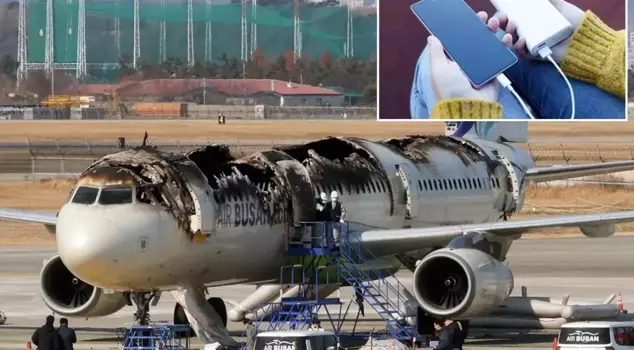
17.06.2025 17:57
The General Directorate of Civil Aviation has issued recommendations regarding the prohibition of using portable chargers, known as power banks, during flights. The statement highlighted that lithium-ion batteries pose risks of overheating, short circuits, and fires.
```html
The General Directorate of Civil Aviation (SHGM) has advised that the use of portable chargers, known as power banks, on board aircraft is prohibited during flights.
A MAJOR SAFETY ISSUE
Following a fire in the overhead compartment of an Airbus A321 belonging to Air Busan in South Korea, attention has once again turned to portable chargers known as power banks. Lithium-ion batteries are used in many areas, from mobile phones to electric cars. However, the risk of overheating, short circuits, and fires associated with these batteries poses a significant safety issue, especially in the aviation sector. Numerous past incidents of fires and explosions have proven how dangerous this technology can be. Recently, SHGM has made recommendations regarding what needs to be done in the aviation sector following incidents that have occurred during flights.
"ELECTRONIC CIGARETTES AND PORTABLE BATTERIES ARE DANGEROUS"
The General Directorate of Civil Aviation stated that portable chargers pose a high risk during flights, saying, "Under certain conditions, these devices can overheat, catch fire, and even explode. In the case of a thermal runaway occurring in the battery of a PED (for example, a fully charged laptop) carried in checked baggage along with normally permitted hazardous materials (such as cosmetics), it has been shown that the likelihood of cargo compartment fire protection systems being able to control the resulting fire is low. The risks of carrying PEDs, including phones, laptops, or tablets, in baggage have been examined in more detail, and it has been determined that carrying PEDs containing lithium batteries in the passenger cabin allows crew members to respond quickly in the event of a battery fire. Other hazardous items that require special attention are electronic cigarettes and portable batteries. Electronic cigarettes can be easily activated and can rapidly increase in temperature, igniting everything nearby. Portable batteries are not PEDs; they are a type of spare battery and are therefore subject to the same restrictions that apply to spare batteries. The transport of all spare batteries, including portable batteries, in checked baggage is prohibited. ICAO Technical Instructions require both aircraft operators and ground handling organizations to inform passengers about restrictions and limitations regarding hazardous materials prohibited from being carried on board the aircraft and permitted items. Passengers must acknowledge this information before boarding the aircraft," it was stated.
"USE ON AIRCRAFT SHOULD BE PROHIBITED"
The statement continued, "Aircraft and airport operators, with the assistance of ground handling organizations, should develop methods to inform passengers about the risks associated with lithium batteries and equipment that operates with them, as well as the restrictions on their transport. It should be recommended that electronic cigarettes and portable batteries be carried in a place where they can be monitored (on the person). The use of portable batteries for charging electronic devices during flights should be prohibited. In the case of carrying spare batteries, including portable batteries or electronic cigarettes, in carry-on luggage, they must be protected from short circuits (for example, carried in their original packaging, terminals closed, and placed in a plastic bag or box), must not be inadvertently activated, must be stored as far away as possible from other batteries and/or potentially flammable materials (such as perfume) in the bag, and must not be charged during the flight," it was stated.
```